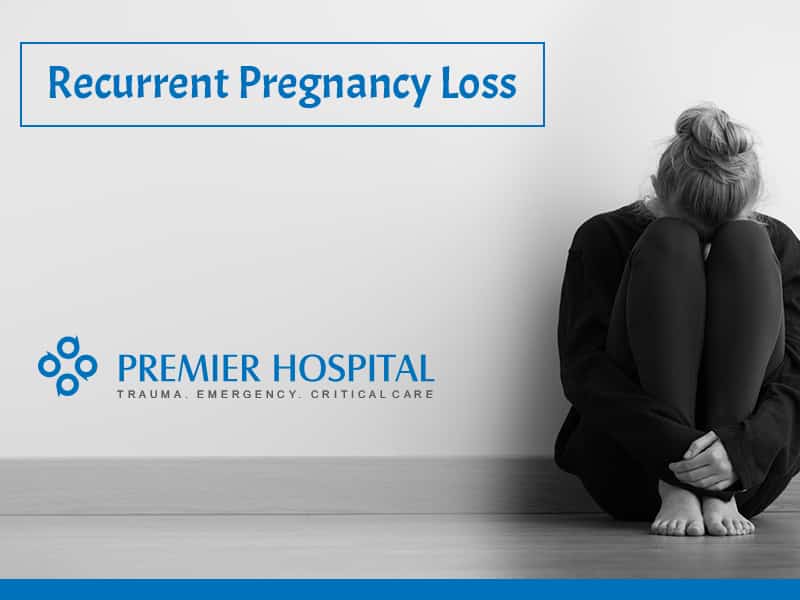Recurrent Pregnancy Loss (RPL): An Overview
by Premier Hospitals | June 21, 2018 |
Isn’t it so exciting to know that you are going to become parents. No words are sufficient to explain the happiness. But as things goes on well there are chances where the pregnancy becomes a miscarriage. It is a terrible experience to go through a miscarriage, however you still have that ray of hope that you can make it it in the second go but just in case, this pregnancy also results in a miscarriage due to various reasons, it is time for you to know about Recurrent Pregnancy Loss. Before it had been 3 or more miscarriages before 20 weeks of pregnancy, but now, it is 2 or more miscarriages after which it is known as Recurrent Pregnancy Loss (RPL). Get To Know How Recurrent Pregnancy Loss Happens In 50% of cases the causes are unknown i.e. unexplained etiology In 20% of cases it is due to Endocrine or Hormonal causes like DM or Hypothyroidism or Luteal phase defect or PCOS. In 15 % of cases it is an Autoimmune disorder
- Hereditary thrombophilias by eliciting prothrombotic state
-  Acquired thrombophilias mostly Antiphospholipid Antibody Syndrome. In this    case the antibodies induce themselves in the decidual vessels and dysregulate maternal immune system
- Congenital anomalies- Septate uterus, Bicornuate or Unicornuate uterus, Cervical incompetence.
- Acquired anomalies- Polyps in the uterine cavity, Uterine Fibroids and intrauterine adhesions.
- For Diabetes Mellitus- Blood sugar testing by glucose tolerance test and HbA1C levels
- For thyroid dysfunction- Serum T3, T4, TSH levels and if necessary estimation of Antithyroid Antibodies.
- For Hyperprolactinemia- Estimation of Serum Prolactin levels
- Â Estimation of Factor V Leiden
- Â Protein C & S levels
- Â Antithrombin III levels
- Anticardiolipin APS
- Lupus anticoagulant
- Anti B2-glycoprotein I
- Karyotyping of both parents
- In spite of all the above thorough investigations if the cause of recurrent pregnancy loss is still  unknown we can then label it as unexplained RPL which accounts of or 50% of cases of RPL.
 After investigating a case of RPL if the doctor diagnose the cause of RPL, then further treatment is directed to correct the problem.
Treatment for Endocrinological cause:
After investigating a case of RPL if the doctor diagnose the cause of RPL, then further treatment is directed to correct the problem.
Treatment for Endocrinological cause:
- If Diabete Mellitus and thyroid dysfunction are controlled the results for future pregnancy are extremely good
- If luteal phase defect is diagnosed then it should be supported with progestogen hormone
- If it is hyperprolactinemia, treatment with Bromocriptine and Cabergoline is advisory
- If it is PCOD, then it requires lifestyle modification, weight reduction exercises and insulin sensitizers
- Hereditary thrombophilias and APLA which can be treated using Heparin and low dose of Aspirin
- Acreditary anomalies like Septat & Bicornuate & Unicornuate uterus usually as a initial line of treatment in these cases bed rests and progestogen support are tried if it fails, then surgical correction is needed
- For septate uterus- Hysteroscopic resection of septum
- For bicornuate uterus- Metroplasty ie unification of two cavities are done
- For cervical incompetence- Cerclage stitch
- Myomas- location of fibroids especially submucous(inside uterine cavity) need removal to improve future pregnancy outcome.
- Polyps - can be removed hysteroscopically
- Intrauterine adhesions- hysteroscopic adhesiolysis can be done
- Couples with abnormal Karyotype are advised to continue attempting pregnancy and it improves the chances of having a child
- Preimplantation genetic Diagnosis is a diagnostic tool for parents with known genetic anomalies
 The prognosis for successful pregnancy depends on the underlying cause for RPL.
The prognosis for successful pregnancy depends on the underlying cause for RPL.
- Endocrinological causes like DM, thyroid dysfunction if controlled properly have more than 90% success rate.
- Anatomical abnormalities if surgically corrected provide 60-90% success rate
- Autoimmune disorders if managed properly has 70-90% success rate
- Parental chromosomal aberrations has a varied success rate between 20-80%
- In unexplained RPL even after 4 prior pregnancy losses the chance of a viable birth is as high as 60%





